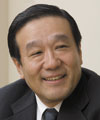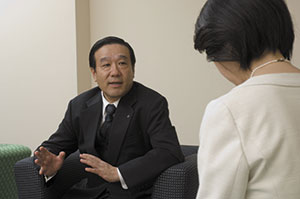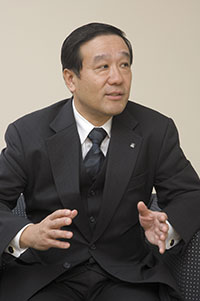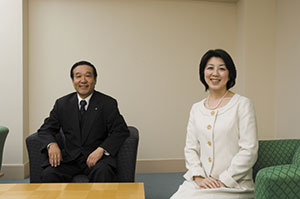 |
|
|
|
|
|
View from the Top Vol. 8, No. 5, pp. 1–4, May 2010. https://doi.org/10.53829/ntr201005tp1  “Trust” and “Spread of New Technologies” Toward an Era where IT Surpasses our DreamsOverviewToshio Iwamoto, Representative Director and Senior Executive Vice President of NTT DATA, has served for many years in leadership positions overseeing services for the public and financial sectors. We asked him about the social role and objectives of NTT DATA looking to the future, about the strengthening of project management in guiding system construction, and expectations for research and development (R&D) from a long-term perspective. Today’s keywords: “trust” and “spread of new technologies”—Mr. Iwamoto, please tell us about NTT DATA’s new Medium-Term Management Policy. First of all, if I were to sum up today’s business environment, I would say that conditions are severe with earnings growth being adjusted downward with respect to the company’s secured profit base. Although it appears that the world is finally bouncing back from the “Lehman Shock,” we must keep in mind that the information technology (IT) industry will probably lag behind by six to eighteen months. Nevertheless, while business conditions are still tough, I feel that the worst is over. Against this background, we have approached management strategy in a somewhat different manner and have initiated a new Medium-Term Management Policy toward 2012. In our previous Medium-Term Management Policy, our aim was to achieve a radical shift from quantity to quality, aiming for sales of a trillion yen. This financial crisis, however, has been called a once-in-a-century event, and with this in mind, we have changed from a focus on simply quality to one on expanding quantity accompanied by quality to increase profit margins. To carry out this management policy from a global perspective, we must accurately assess today’s dramatically changing trends throughout society and future trends. Here, I believe that considering what risks and business opportunities exist in our customers’ changing business environment and supporting those opportunities from an IT perspective is more important than anything else in establishing our business strategy and making business decisions. If I were to give one example of a key social trend, it would be changes in the demographic structure brought on by the aging society, which I take to be an important factor in the way we think about our business strategy. The size of today’s workforce in Japan is about 80 million people, but this figure is predicted to fall by about half by 2050. Thus, if we consider that a productive person equals a consumer, this state of affairs means that production and distribution throughout society is destined to fall by about half. Knowing this, Japan’s national strength will surely drop if we just stand by and do nothing. Consequently, while the problem of the aging society is one of today’s biggest political issues, we cannot, from the perspective of a private company, just wait for the government to do something about it. In short, it won’t do to focus on just the domestic market—we must broaden our field of vision to include the whole world. That is, we must uncover global market trends of changes in diverse problems related to demographics, food, the environment, and energy and expand the range of our activities accordingly.
—In establishing a global perspective, what do you think NTT DATA should place most importance on? To put it simply, the business of NTT DATA is, in the end, to provide services to end users by constructing systems for financial, corporate, and government enterprises. In this regard, I would say that NTT DATA should care about two things in particular. First, it is important that we continuously strive to improve customer relations and customer satisfaction. Of course, it goes without saying that developing and completing an ordered system within the delivery period, quality level, and cost agreed upon is important. For some systems, however, we need to ensure stable operation and maintenance after service launch, and we must also make proposals incorporating the latest technologies and concepts on an ongoing basis to help our customers expand their businesses. Being in charge of the public and financial sectors in the company, I was able to launch a number of big projects in both of those sectors at the beginning of this year. It is important that we keep initiating such projects in a steady manner to meet our customers’ expectations and improve customer satisfaction. Second, given that NTT DATA is an IT company, it is important that we keep our customers up to date on technical trends not just in Japan but in the world at large and that we provide them with advanced technologies. For example, cloud computing became a big catch phrase last year throughout the world. Although the English word cloud can generate various impressions in people, there have been a surprisingly large number of managers who think that cloud computing represents the birth of a completely new technology. Our job is to clear up such misunderstandings or doubts and explain the real meaning of cloud computing and to give our customers a clear explanation of how it might be useful in their lines of business and provide it if it is appropriate. This is also an important mission of NTT DATA. There is nothing as important as meeting our customers’ expectations. Desiring not be a hero, but to support the heroes—As you said, the work of NTT DATA is involved with us, the end users, only indirectly. Doesn’t that make it difficult to understand the kind of company that NTT DATA is. To be sure, it’s important that the name NTT DATA is known by the general public, and to this end, the company is involved in various community activities in addition to public relations activities in the media. For example, we recently sponsored the inter-prefectural road relay race held in Hiroshima prefecture. I would like to think that many people noticed the NTT DATA logo on the athletes’ numbers. We sometimes get asked what kind of products NTT DATA produces. This is rather difficult to explain. Even if I said something specific like “We provide air-lane radar control systems to make flying safe in Japan,” no doubt I would still get a blank stare. We don’t provide concrete products that people can put their hands on, so in a sense, it’s kind of hopeless to try to explain. In actuality, however, we have been developing and providing social infrastructure systems with state-of-the-art technologies for the financial and government sectors for about 40 years, a period that overlaps with the Nippon Telegraph and Telephone Public Corporation era. NTT DATA products are used in places and situations familiar to everyone. To give an example, you have probably noticed that a single type of machine at a retail store can authenticate various types of credit cards even if they have been issued by different financial institutions. The network that makes this possible, which is called CAFIS, is an NTT DATA product. In addition, the cash cards that we all use can be used at the automatic teller machines (ATMs) of any bank, and behind all this is an ATM network from NTT DATA that interconnects the various banks 24 hours a day. NTT DATA is also in charge of most domestic settlement systems and networks such as the Bank of Japan network and other inter-bank systems. We take pride in supporting society in such behind-the-scene ways. We want the technologies and networks that we have been developing and providing for 40 years to evolve even further toward the future while we continue to deal soundly with changes occurring in the near future. This, I believe, is the reason for our existence.
Living in an era where IT surpasses our dreams—NTT DATA appears to be growing day by day with an eye on technologies for the near future. With IT advancing rapidly, what kind of future can it help create? In 1901, at the dawn of the 20th century, an interesting newspaper article predicted 23 things that, though just a fantasy at the time, would come true within 100 years. It said, for example, that it would one day be possible for people separated by a distance to talk to each other using a device that we today call a videophone. Reading that article, we can see that many of the dreams, desires, and futuristic concepts held by people at that time have already come true thanks to modern technologies. If we were to associate this progress in civilization and technology with the human body and human functions, we might say that the modern information-communication revolution is sharpening our brain and sensory organs. Servers and networks can be likened to the brain and its nervous system, and sensors, whose role and value are increasing dramatically, can be likened to sensory organs. For example, we have already reached a stage in which information about congested highways can be acquired and distributed to drivers and in which a driver can be notified that a nearby car has come too close. Mechanisms now being developed, however, will make it possible to provide guidance to drivers to prevent traffic jams from occurring in the first place and to automatically prevent two cars from colliding. In the cooking field, as well, technologies for reproducing the senses of taste and smell are making progress. If such technology development continues to advance, we can imagine the information-communication revolution entering a completely new stage by the middle of this century. At the same time, there are always negative aspects to technological advances. A new technology may come to be used in adverse ways or produce unwanted effects that developers could not have imagined. Nevertheless, this is not a reason to back down. The onward march of technical innovation cannot be stopped, and we must make a concerted effort to minimize drawbacks. In any era, the desire of customers for new value does not change even though the forms of technologies do. We believe that our work will be just as necessary in the future, and with this in mind, we will continue in our efforts to meet our customers’ needs. —I would think that project management is important in creating such future and global technologies. What qualities do you look for in a project manager? It has been more than 60 years since the development of ENIAC, the world’s first computer, and it has only been 17 years since 1993, the so-called first year of the Internet. In such an ever-growing industry, the role of a project manager is vitally important. What must not be forgotten here is that it is people that get a project going. A very large project can easily involve the activities of several thousand people at one time. This is why I say to project managers “Be philosophers!” A project manager must develop the ability to motivate a large number of people. Philosophy, to put it simply, is a field of study that considers how one wants to live. And the first step here is self-realization. If a project manager has a firm “this is how it should be” life philosophy, then guiding principles will naturally follow. Even if project managers have different methodologies, they will be able to empathize with some points of each other’s principles. Without such empathy, a project manager cannot motivate other people. At NTT DATA, there are four levels of in-house qualifications for project managers. At present, there are about 3000 project managers divided into principal, executive, senior, and associate categories, with principal being the highest. To step up to a higher level, a project manager—in addition to having work experience—must undergo an objective check of practical abilities by an upper-level project manager as a third-party evaluator. A big-headed person won’t do as a project manager. —Mr. Iwamoto, please leave us with a message for R&D, which provides support for NTT DATA projects. First of all, I would like to see R&D create things that are Japan firsts. This behind-the-scenes, infrastructure development industry does not have a long history; it has not yet reached a firmly established engineering level like architectural engineering or electrical engineering. For this reason, I would like to see R&D create things that can help bring the industry up to that level. In this pursuit, I want researchers and engineers to take pride in the fact that, as employees of NTT DATA, they have been providing mission-critical social-infrastructure systems and creating high-reliability products. In addition, the truth is that R&D at NTT DATA is carried out with an emphasis on early implementation, and as a result, there is a tendency to seek out a good return on investment. There are things that even personnel like me on the management side must reevaluate, and I would like to ask researchers and those involved with research to look ahead at future technologies as much as possible and to become involved in near-future activities without losing sight of their current targets. I place high hopes on R&D at NTT DATA.
Interviewee profileCareer highlightsToshio Iwamoto joined Nippon Telegraph and Telephone Public Corporation (now NTT) in 1976. Following the spinoff of the NTT Data Communications division into NTT DATA CORPORATION in 1988, he served as Senior Executive Manager of the Settlement Solutions Sector from 2004, Director and Executive Vice President in charge of the Financial Business Sector from 2007, and Director and Executive Vice President in charge of the Financial Sector from 2008. He assumed his current position in June 2009. |
|










